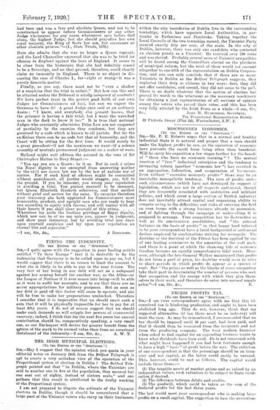MISCHIEVOUS ECONOMICS.
[To THE EDITOR or THE " SPECTATOR."] Sra,—Mr. P. E. Roberts urges that in a normal and healthy industrial State it is natural and proper that a man should make the highest profits he can, as the operation of economic laws prevents the result from being other than beneficial. Will he carry his exposition a few stages farther for the benefit. of " those who have no economic training " ? The mutual reaction of "free" industrial enterprise and the tendency to increasing return (another "economic law ") has resulted in an aggregation, federation, and co-operation of businesses. Even without " excessive monopoly profits " there may be an inevitable monopolistic tendency. The rate of profits under such circumstances (which have not developed by support of legislation, which are not in all respects anti-social, though they are frequently associated with restrictive and militant policies, and which cover a large section of British industry) does not inevitably attract capital and organizing ability to compete owing to the difficulties and risks of entering the field on even terms with a strong business already in possession, and of fighting through the campaign of underselling it is prepared to arrange. Free competition has its destructive as well as its constructive possibilities, and " the colossal fortunes on the basis of profits" in that happy land referred to by your correspondent have a lurid background of anti-social devices employed by combinations striving for monopoly. The doctrine of the Survival of the Fittest has been applied by one of our leading economists to the amenities of the wolf pack, and there is a point at which the cleansing tide of economic freedom becomes an equally comprehensive tidal wave. More- over, although the late General Walker maintained that profits do not form a part of price, his doctrine would seem to refer to short.periods in which profits do appear ns a species of rent. But "the prizes as well as the blanks of every occupation take their part in determining the number of persons who seek that occupation and the energy with which they give them- selves to their work, and therefore do enter into normal supply






































 Previous page
Previous page